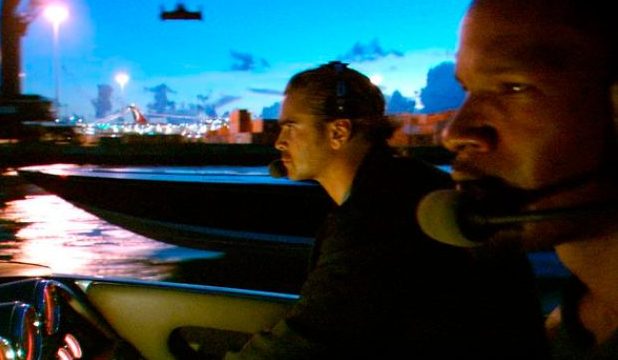In 1987, The Untouchables’ success kicked off a trend of movies adapted from TV series. In the coming years, The Fugitive, Mission: Impossible, The Addams Family, The Beverly Hillbillies, The Brady Bunch Movie, The Flintstones, and George of the Jungle (and many others) all found commercial, if not critical, success, before the trend came to a crashing halt with 1998’s calamitous The Avengers (the other ones). Since then, most adaptations have been decidedly hit-or-miss; for every 21 Jump Street, there are dozens of Baywatches. Most have tried to find success by snarking on the shows they’re adapting — a smart idea, if not always a successful one.
Which makes it even stranger that a movie like 2006’s Miami Vice exists. Reteaming director Michael Mann (a producer on the original show) and star Jamie Foxx (who came to Mann with the idea) after their Oscar-nominated hit Collateral, Miami Vice must have seemed like an out-of-the-box hit; it’s hard to see why the studio would have ponied up a reported $135 million budget otherwise. But while the show was a prime slice of ‘80s cheese, famously pitched as MTV Cops, the movie was a deadly serious piece of business. It’s a perverse decision: adapting Miami Vice into a movie about the spiritual and psychological toll of undercover police work is like a Perfect Strangers remake that uses Cousin Balki’s plight to explore America’s broken immigration system.
It was a smarter idea than it first appears, though. Before calcifying into a mindless parody of itself, the show was known for adopting a more cinematic sensibility than the average cop show. Style over substance has always been the appeal of the show, and updating that style to digital video and 2000s rock makes sense. At its best, the movie feels like a feature-length version of the celebrated sequence from the pilot episode where Crockett and Tubbs drive to a shootout and an unknown fate to the strains of Phil Collins’ “In the Air Tonight” (which gets a terrible cover here, courtesy of nü metal also-rans Nonpoint).
The film starts disorienting and alienating its audience early, abruptly opening on a club scene set to Linkin Park and Jay-Z’s “Numb/Encore,” introducing its protagonists Crockett (a grimy Colin Farrell, stepping in for the suave Don Johnson) and Tubbs (Foxx, taking over for Philip Michael Thomas) in the middle of a mission tailing a human trafficker. Crucially, the sound mix is so loud and abrasive that it’s almost impossible to make out what’s going on. The mission is interrupted by a frantic call from an informant (John Hawkes), who brutally commits suicide upon hearing his family’s been murdered under orders from drug kingpin José Yero. From there, the plot proceeds with Crockett and Tubbs going undercover in Yero’s organization. It’s a simple story, made almost incomprehensible underneath the jargon-heavy dialogue.
But the plot isn’t the point of the movie. It exists primarily on vibes and builds its central tragedy on the doomed romance between Crockett and Yero’s associate Isabella (Gong Li, in an entirely phonetic performance). The romance is drained of the usual cinematic signifiers of love, meaning it rests entirely on the chemistry between the actors. For many audience members, the languorous pace and lack of traditional plot beats were a step too far. The movie bombed commercially and received mixed reviews.
Those involved with the film have expressed disappointment in the finished project in the years since. Mann and Farrell in particular have felt like the project got away from them. However, it has attracted a growing cult amongst Film Twitter types, who latch on to its impeccable style and lack of ironic distance. While films like 21 Jump Street have found success by poking fun at their subject, it’s becoming increasingly rare for movies like this to take their subject matter this seriously. When Mann acolyte Christopher Nolan’s Tenet likewise crafted an alternately simple and convoluted plot and coupled it with an emphasis on vibe and a moving, emotional friendship dynamic, it felt like validation for one of 2006’s best movies. Miami Vice remains a perverse movie, but wonderfully so.

